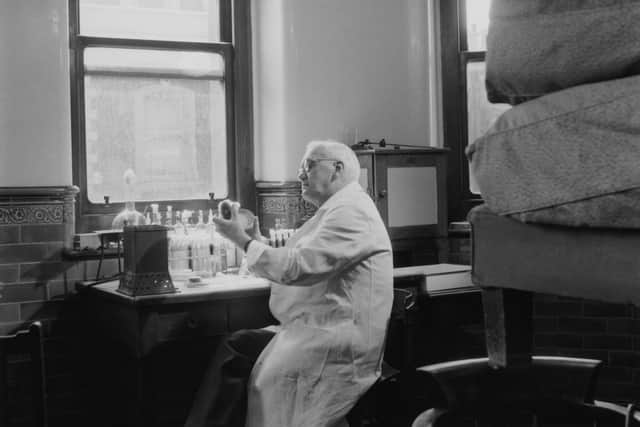As my cancer responds to old-fashioned treatment, thank goodness for all the drugs that Big Pharma didn't get to patent – Kate Copstick
Supernatural horror and singer-songwriter Carole Bayer Sager might not seem to have much in common. But fans of Stephen King’s novel Colorado Kid and musical marvellousness – I know there is no such word, but it sits well here – will know that their minds meet on one opinion. I will give you King's version, as I believe that to quote Carole's song without actor Ann Reinking's voice is simply wrong: “Sooner or later, everything old is new again.”
It is a comforting thought to those of us who remember a life where the most exciting intelligence was real, not artificial, when we had bustling high streets, not Amazon pick-up points, and where kids' games involved other kids and the possibility of a scabby knee as opposed to merely their thumbs and a desire to annihilate everything onscreen in front of them.
Advertisement
Hide AdAdvertisement
Hide AdRecently the question on everyone's digital lips has been: “Have you tried Threads?” Personally, the answer is no. But more than 100 million have signed up already, according to Mark Zuckerberg. Because it is new and it is there and the blinding ‘Fomo’ that 'The New' creates nowadays is seemingly irresistible. It is the disease of our time.


Anyone I actually know who has gone to the Mark Side is already missing their sweet tweety past and ready to go back to the good old ways. I find it hard to get excited about but it is certainly fighting an anonymous BBC presenter alleged to have a taste for the gilded (but otherwise, barely dressed) youth for space on front pages everywhere. I suppose The New is always News.
But, increasingly, I read, people are finding a way back. I was mightily delighted to read – in hard copy – just yesterday, of a young lady who made a fortune selling dresses on TikTok, making her first £500 in just 30 minutes, and who is now opening a high street shop. An actual real-world shop. With people and conversation and everything.
Because for all the money she is making online, she finds that many of her customers want, and respond to, and come back for the personal, human attention they get in an actual, real-world shop. This is, I read, part of a new and growing trend. Retail going back to the future?
Now, bear with me. What has brought all this on, you are – quite rightly – asking yourselves. Is the wrinkly old bizzum just having a go at Gen Z again? No. She is not.
But I was recently drawn to ponder the under-appreciated worth of the old. On a personal level. What we too often fail to remember is that, whereas having 'the New' was once a matter of life and death, light and dark, victory and defeat, generally, nowadays, 'the New' is all about money. OK maybe faster and easier, but mainly money for the makers and the controllers of the New. How many of today's innovations are there to help anyone who actually needs help?
Internet banking and shopping and paying and borrowing and meeting and getting advice don't help the little people. They help the big people. To get more money out of the little people. Because little people tend to live in the real world. With real money. And it is getting quite pricy down here. But I digress.
One of the biggest operators in the “Look! It is New, it must be better, give us money!” marketplace is Big Pharma. Huge, probably unimaginable amounts of money flow into their corporate coffers over the prostrate bodies of the very sick. Because The New must be better than The Old.
Advertisement
Hide AdAdvertisement
Hide AdHowever, I am writing to you from a haemo-oncology day-care unit, where I am having a venosection – a bloodletting, as they used to call it in the days when being bled was reckoned to cure everything from an irritable bowel to scrofulous whatnots.
I have been diagnosed with what my lovely specialist calls a “low-grade but quite rare” cancer of the bone marrow. Genetic. Philip Larkin will never know how right he was. On the upside, it is “manageable” and a primary line of management is to take off a pint or so of blood every few weeks. Yes, really. Just like in the olden days. And I tell you something? It is working!
I will also be put on a very old form of chemo, taken orally. It got me thinking, as my blood skooshed into a big plastic bag – I am also on Warfarin, first used in 1941 and irreplaceable for certain diseases – that we should be much more impressed by these medical treatments that have never been bettered in a century and a half, and which Big Pharma would love to have patented. And to have made much more expensive.
Aspirin (1899) is an anticoagulant and painkiller combined, and penicillin (1928) is still saving lives globally. Nitroglycerin (1867) is still calming hearts and dilating veins while digitalis (used for centuries) has been on prescription for dodgy tickers here since 1940. Even the leech (back to bloodletting) has never, in 3,000 years, been bettered for their secreted, anticoagulant molecules that enhance circulation and promote wound healing.
So, I certainly am taking a moment to celebrate the old ways. Hot toddies and a Vicks chest rub, poultices and camphorated oil. I might even get myself a pet leech.
Comments
Want to join the conversation? Please or to comment on this article.
